Dear WesleyNexus Colleague:
Christians around the world are celebrating the season of Advent during this month. The first season in the Christian church year, it is a time when we look forward to reflecting and celebrating the coming of Jesus. Worship services incorporate prophetic statements from the Old Testament foreshadowing the coming of the messiah, while New Testament readings proclaim the fulfillment of those passages in the person of Jesus. A more general definition of advent, not used as a proper noun, is “the arrival of a notable person, thing, or event” such as the advent of the internet, that ubiquitous tether that binds us all together and enables WesleyNexus to share this science and religion newsletter with you. While Advent is explicitly a religious event, most non-professionals focus attention on the various arrivals of persons, things or events that constitute the various disciplines within science. Galileo, Newton, Darwin and Hubble represent impactful persons within the disciplines of astronomy, physics, biology and cosmology while the advent of the telescope, calculus, evolutionary theory and the Hubble spacecraft enabled significant advances in the way we understand the natural world. For both definitions, in Christianity and in science, advent points to something specific and particular that stands out within the overall narrative arc. Advent provides a marker within the flow of an unfolding story that is viewed as significant and worthy of note.
If reality is viewed as a narrative with increasing complexity and emergence of new qualities over time, numerous advent occasions can be seen. From the big bang to the formation of planets, the emergence of single cell life forms, the movement of sea life on to dry land, to the development of the human brain, a progressively complex story can be seen. But there is no justification to assume the story ends here. Further advents will likely occur with implications unknown. We are at the beginning of the advent of the Anthropocene era, viewed as the period during which human activity will remain the dominant influence on climate and the environment. For many Christians, how we respond to the Anthropocene era is bound up with our response to holy Advent. With the recent report on climate change, it is becoming clearer that the time for repentance and action is becoming short. WesleyNexus encourages all of us to take this challenge seriously, both as a matter of science and as a matter of Christian calling. In this issue, we have included multiple articles for your reflection. You can find a recent article from the NY Times here.
We appreciate the contributions we have received throughout the year. We are now rebuilding our small treasury to produce the sixth annual Evolution Weekend in Maryland, hoping that we will again have the funds to livestream the event for our colleagues around the country. You still have time to gain a tax deduction in 2018 with a donation to support our work. Our theme for the 2019 event on February 10 will be “Human Origins,” so please make your plans accordingly. Looking forward, we will continue to develop programs throughout 2019 as funds permit. We will need your support and hope you will consider helping us out. WesleyNexus is a 501(c)(3) charitable, educational organization, and we will acknowledge all gifts from individuals for tax reporting purposes. Thanks in advance for your support.
God Bless,
Rick, Maynard, and the rest of the
WesleyNexus Board of Directors
*********************************
Support WesleyNexus’ End-of-Year Fundraising Campaigns
While the perceived conflict between science and Christian faith is nothing new, as we head into 2019 we recognize that the stakes could not be higher in this ongoing, and unnecessary, culture war. On the church side, studies show that 60% of our young congregants are leaving church and faith after the age of 15 and that perceptions of conflict between science and faith contribute significantly to this “dropout problem.” On the secular side, rejection of science contributes to the anti-vaccination movement, lack of action on climate change, and science illiteracy. Clearly, there are no winners in this culture war.
There is a better way—a way that brings faith and science into conversation and side-by-side practice. The mission of WesleyNexus is to promote this dialogue in the Wesleyan tradition for the betterment of both church and society. But, our continued work depends on your support. Please consider making a tax-deductible donation in support of WesleyNexus’ initiatives for adults or its work through Discovery & Faith, which is developing resources for use with children and youth. Many thanks in advance for making this important work possible.
To support WesleyNexus:
To support Discovery & Faith:
https://www.discoveryandfaith.org/how-you-can-help/
*********************************
Reminder to SAVE THE DATE!
Evolution Week-end – Maryland event February 10, 2019, 3:00-5:30 EST.
The 2019 Evolution Week-end event will be sponsored by WesleyNexus, live from the Baltimore-Washington Conference Center of the United Methodist Church. The 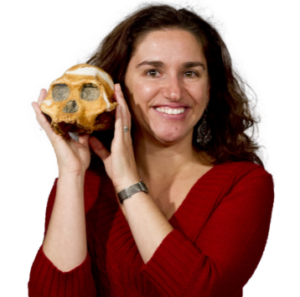 theme for 2019 is Human Origins: Social and religious Impacts. Featured speakers are Dr. Briana Pobiner, Research Scientist, National Museum of Natural History, Smithsonian Institution and Dr. Constance Bertka, President, Science and Society Resources, Smithsonian Consultant. Paleoanthropological discoveries continually provide us with new insights into the six million year history of humanity. While the fundamental narrative of life’s interrelatedness through evolutionary processes remains intact, ongoing fossil and archeological discoveries and advances in genetic studies enrich our understanding of the similarities, differences, and the relationship of modern Homo sapiens to earlier human species. Religious traditions in pursuit of global understanding and reconciliation will find both challenges and opportunities in the science of our origins. The presenters will review
theme for 2019 is Human Origins: Social and religious Impacts. Featured speakers are Dr. Briana Pobiner, Research Scientist, National Museum of Natural History, Smithsonian Institution and Dr. Constance Bertka, President, Science and Society Resources, Smithsonian Consultant. Paleoanthropological discoveries continually provide us with new insights into the six million year history of humanity. While the fundamental narrative of life’s interrelatedness through evolutionary processes remains intact, ongoing fossil and archeological discoveries and advances in genetic studies enrich our understanding of the similarities, differences, and the relationship of modern Homo sapiens to earlier human species. Religious traditions in pursuit of global understanding and reconciliation will find both challenges and opportunities in the science of our origins. The presenters will review 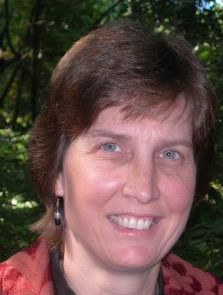 the most recent science, highlight key points for conversation, and encourage a discussion of these points among religious leaders. All persons in attendance will qualify for door prize drawings. Food and refreshments will be available, starting at 3:00 pm, and the program will commence at 3:30. Pre-registeration is not required. The event will be live-streamed and available on the WesletNexus website for individuals who cannot attend in person, and for local congregations to download for small group discussion. More information is available on the website: www.wesnex.org.
the most recent science, highlight key points for conversation, and encourage a discussion of these points among religious leaders. All persons in attendance will qualify for door prize drawings. Food and refreshments will be available, starting at 3:00 pm, and the program will commence at 3:30. Pre-registeration is not required. The event will be live-streamed and available on the WesletNexus website for individuals who cannot attend in person, and for local congregations to download for small group discussion. More information is available on the website: www.wesnex.org.
*********************************
2019 IRAS Summer Conference: June 22-29 on Star Island
The 65th Annual Summer Conference sponsored by the Institute on Religion in an Age of Science is scheduled for June 22-29, 2019 in Star Island off the coast of Portsmouth, New Hampshire.
Bioengineering, Gene Editing, and the Human Future:
The CRISPR Apple on the Tree of Knowledge
 Human gene editing is quickly outstripping the decision-making mechanisms we have in place for approving or regulating technology usage. The technology to directly manipulate the genomes of plants, animals and even humans is developing rapidly and is already in use. Can it be rationally managed and applied ethically? What are the medical, economic, environmental, and social consequences of genetic manipulation? At this conference, scientists, theologians, religious scholars and ethicists will offer illuminating and thought-provoking perspectives on the issues surrounding the gene-editing technology known as CRISPR. Scientists will explain the technique of gene editing with CRISPR and ethicists will ponder the impacts on society, from pest control to designer babies. What are the implications for agriculture and world hunger? What about medical advances that are too costly for most of the world? Theologians and religious scholars will discuss how we understand human nature and responsibility from within various religious traditions such as Christianity, Islam, Judaism, Buddhism and Hinduism. Most fundamentally, we will explore ethical issues such as therapy versus enhancement; species elimination versus global epidemic; germline intervention; and the long-term effects of bioengineering and genome editing that are within the realm of CRISPR possibility.
Human gene editing is quickly outstripping the decision-making mechanisms we have in place for approving or regulating technology usage. The technology to directly manipulate the genomes of plants, animals and even humans is developing rapidly and is already in use. Can it be rationally managed and applied ethically? What are the medical, economic, environmental, and social consequences of genetic manipulation? At this conference, scientists, theologians, religious scholars and ethicists will offer illuminating and thought-provoking perspectives on the issues surrounding the gene-editing technology known as CRISPR. Scientists will explain the technique of gene editing with CRISPR and ethicists will ponder the impacts on society, from pest control to designer babies. What are the implications for agriculture and world hunger? What about medical advances that are too costly for most of the world? Theologians and religious scholars will discuss how we understand human nature and responsibility from within various religious traditions such as Christianity, Islam, Judaism, Buddhism and Hinduism. Most fundamentally, we will explore ethical issues such as therapy versus enhancement; species elimination versus global epidemic; germline intervention; and the long-term effects of bioengineering and genome editing that are within the realm of CRISPR possibility.
The Call for Papers is now out, and all theologians and scientists, professionals and grad students, are encouraged to submit for presentations or poster sessions. Scholarships are available. For more information go to the IRAS website www.iras.org.
*********************************
Global warming will happen faster than we think by Yangyang Xu,
Veerabhadran Ramanathan & David G. Victor
In this article published in Nature on December 5, three atmospheric scientists address the recent report from the IPCC which addresses in great detail the need to  respond to the dangers of anthropocentric climate change. As the authors point out, “Policymakers have less time to respond than they thought. Governments need to invest even more urgently in schemes that protect homes from floods and fires and help people to manage heat stress (especially older individuals and those living in poverty). Nations need to make their forests and farms more resilient to droughts, and prepare coasts for inundation. Rapid warming will create a greater need for emissions policies that yield the quickest changes in climate, such as controls on soot, methane and hydrofluorocarbon (HFC) gases. There might even be a case for solar geoengineering — cooling the planet by, for instance, seeding reflective particles in the stratosphere to act as a sunshade.” While most readers will not wade through mammoth IPCC report, this article presents n important, though sobering, perspective on the need for action on climate change. It can be found here.
respond to the dangers of anthropocentric climate change. As the authors point out, “Policymakers have less time to respond than they thought. Governments need to invest even more urgently in schemes that protect homes from floods and fires and help people to manage heat stress (especially older individuals and those living in poverty). Nations need to make their forests and farms more resilient to droughts, and prepare coasts for inundation. Rapid warming will create a greater need for emissions policies that yield the quickest changes in climate, such as controls on soot, methane and hydrofluorocarbon (HFC) gases. There might even be a case for solar geoengineering — cooling the planet by, for instance, seeding reflective particles in the stratosphere to act as a sunshade.” While most readers will not wade through mammoth IPCC report, this article presents n important, though sobering, perspective on the need for action on climate change. It can be found here.
********************************
5 myths about climate change by Katharine Hayhoe
Katharine Hayhoe, director of the Climate Science Center at Texas Tech University, published an article nationally distributed that targets the top five myths about climate 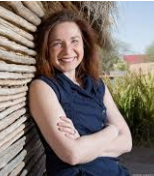 change propagated by those who deny anthropogenic climate change:
change propagated by those who deny anthropogenic climate change:
- Climate scientists are in it for the money.
- The climate has changed before. It’s just a natural cycle.
- Climate scientists are split on whether it’s real.
- Climate change won’t affect me.
- It’s cold outside — global warming can’t be real.
Response to these beliefs can be found here.
*********************************
Climate Change and the Church’s Response
2016 Book of Resolutions
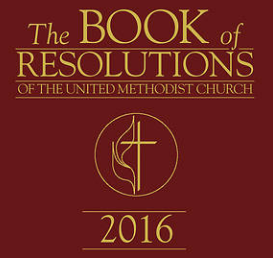 The United Methodist Church
The United Methodist Church
During the 2016 General Conference, the United Methodist Church passed a resolution for all clergy and laity to take seriously the stewardship and care of creation and to take climate change seriously. The resolution can be found here.
*********************************
Professor Amy-Jill Levine on Scripture Interpretations – Nov 27
Last week Dr. Amy-Jill Levine spoke to a packed house at Temple Beth Ami in Potomac, Maryland, co-sponsored by the Foundation for Jewish Studies. Levine has the distinction of being the only Orthodox Jew to be teaching New Testament in a Protestant seminary (Vanderbilt University and Divinity School), and is a frequent lecturer at the American Academy of Religion and elsewhere across the world. The topic was “How Jews and Christians Read Scripture Differently… and Why It Matters.” Her main point was that, although Jews and Christians share common books – the Jewish Tanakh and the Christian Old Testament – we read our shared stories in distinct ways. The variations in translation, punctuation, definitions, theology, emphasis, and even canonical order all lead to differences in community self-definitions. She asked, what prompts these differences, and what do they suggest about Jewish and Christian priorities and relations? As a context, she pointed out that one is “born into” Judaism and 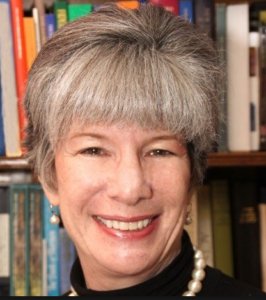 although one can ignore the tradition and live a secular life, one remains a Jew, even if one actively participates in the community and declares oneself to be an atheist. In contrast, even though one can be born into a Christian family, continued identification depends on belief, and one can “get in” through belief and out by discontinued belief. This means, with regard to scripture, the church looks for a “right reading,” whereas for Jews, arguments about interpretations of scripture are essential and occur forever. There is no single “right” interpretation of any single text. Dr. Levine rehearsed the history of biblical translations, and pointed out several difficulties with the Vulgate Latin translations, and also the Greek texts from the Septuagint. She pointed out instances where the lack of punctuation in the original Hebrew leads to different interpretations. She pointed out significant differences in meaning when a comma is inserted in a compound sentence at different places in the Jewish Tanakh and in the Christian Old Testament. Most significantly, she pointed out how the phrase “young woman” in Isaiah was translated into English as “virgin,” with consequences apparent into the modern day. She spent a good deal of time dealing with the root translations of words: such as – the word for “burnt offering” in the Hebrew scriptures is the root for “holocaust.” And she pointed out how in the Christian New Testament the tendency to “allegorize” parables and stories often obscures the original intent of the authors, cautioning that we have to be cognizant of our assumptions when we interpret texts. She ended by urging both Christians and Jews in the audience to look for ways to read scripture together in order to come to a deeper understanding, and also a way in which we can build respect for others, who consider the scriptures as sacred.
although one can ignore the tradition and live a secular life, one remains a Jew, even if one actively participates in the community and declares oneself to be an atheist. In contrast, even though one can be born into a Christian family, continued identification depends on belief, and one can “get in” through belief and out by discontinued belief. This means, with regard to scripture, the church looks for a “right reading,” whereas for Jews, arguments about interpretations of scripture are essential and occur forever. There is no single “right” interpretation of any single text. Dr. Levine rehearsed the history of biblical translations, and pointed out several difficulties with the Vulgate Latin translations, and also the Greek texts from the Septuagint. She pointed out instances where the lack of punctuation in the original Hebrew leads to different interpretations. She pointed out significant differences in meaning when a comma is inserted in a compound sentence at different places in the Jewish Tanakh and in the Christian Old Testament. Most significantly, she pointed out how the phrase “young woman” in Isaiah was translated into English as “virgin,” with consequences apparent into the modern day. She spent a good deal of time dealing with the root translations of words: such as – the word for “burnt offering” in the Hebrew scriptures is the root for “holocaust.” And she pointed out how in the Christian New Testament the tendency to “allegorize” parables and stories often obscures the original intent of the authors, cautioning that we have to be cognizant of our assumptions when we interpret texts. She ended by urging both Christians and Jews in the audience to look for ways to read scripture together in order to come to a deeper understanding, and also a way in which we can build respect for others, who consider the scriptures as sacred.
Thanks to Ruth Alice White for her notes provided from this lecture.
*********************************
The Return of Paganism: Maybe there actually is a genuinely post-Christian future for America. By Ross Douthat.
On December 12, Ross Douthat, NY Times columnist wrote a provocative reflection about the state of religion in the United States. As most people are aware, participation in institutional religion is down significantly, particularly among those under the age of 35. This apparent “secularization” does not mean that spiritual 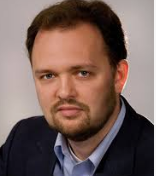 experience is dead but appears to be changing focus, more syncretistic and diverse, conceptually a post-Christian society. As Douthat puts it, “What is that conception? Simply this: that divinity is fundamentally inside the world rather than outside it, that God or the gods or Being are ultimately part of nature rather than an external creator, and that meaning and morality and metaphysical experience are to be sought in a fuller communion with the immanent world rather than a leap toward the transcendent”. While Douthat and others may have misgivings about the changes that are developing, for others there appears to be an opportunity to be more responsive to the demands of creation care and environmental stewardship needed in the Anthropocene era. The article can be found here.
experience is dead but appears to be changing focus, more syncretistic and diverse, conceptually a post-Christian society. As Douthat puts it, “What is that conception? Simply this: that divinity is fundamentally inside the world rather than outside it, that God or the gods or Being are ultimately part of nature rather than an external creator, and that meaning and morality and metaphysical experience are to be sought in a fuller communion with the immanent world rather than a leap toward the transcendent”. While Douthat and others may have misgivings about the changes that are developing, for others there appears to be an opportunity to be more responsive to the demands of creation care and environmental stewardship needed in the Anthropocene era. The article can be found here.
